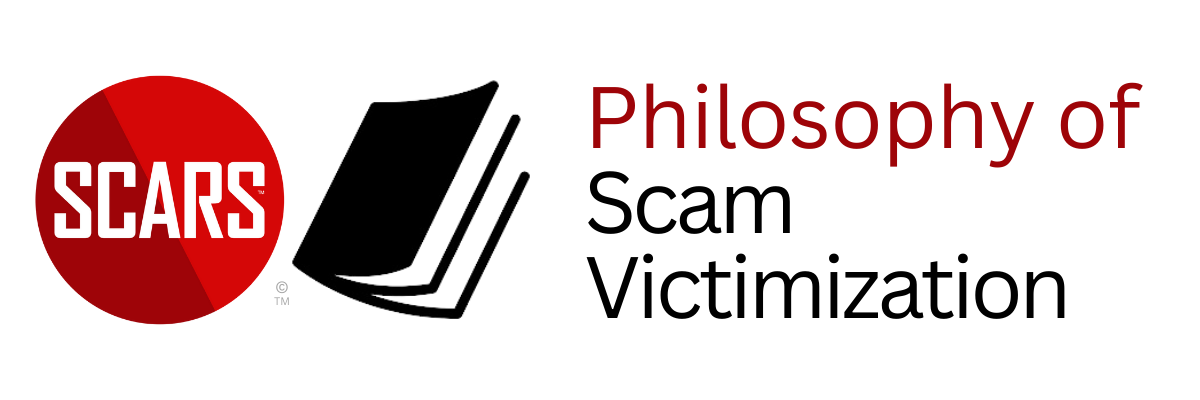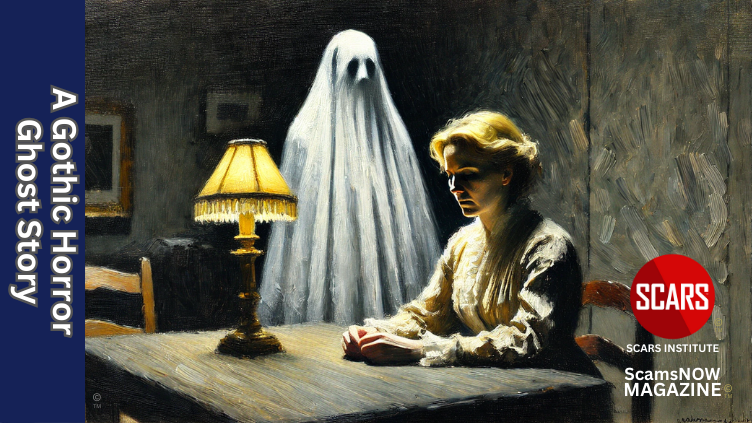Scam Victims Recovery – A Gothic Horror Story for Many
For Many Scam Victims, the Aftermath of the Scam Becomes a Gothic Horror or Ghost Story – The Gothic Horror Lens on Scam Victim Recovery
Primary Category: Philosophy of Scam Victimization
Author:
• Tim McGuinness, Ph.D., DFin, MCPO, MAnth – Anthropologist, Scientist, Polymath, Director of the Society of Citizens Against Relationship Scams Inc.
About This Article
The aftermath of a scam unfolds like a gothic horror story, where the scammer emerges as a Victorian ghost, haunting the victim’s darkest moments with the lingering specter of betrayal, while the victim’s mind becomes a haunted house filled with fear, shame, and mistrust. This gothic lens reveals the psychological toll of the scam, mirroring classic horror thrillers where reality unravels amidst spectral terrors, as the scammer’s manipulation plants seeds of doubt that fuel a mental fog of anxiety and hypervigilance.
Recovery becomes a hauntological journey of exorcism, a determined effort to banish the ghost by confronting emotional wounds—loss of trust, security, and self-esteem—and working through lingering shame. Though fraught with challenges, like navigating a haunted house, this non-linear process transforms the mind into a sanctuary of resilience.
By exorcising the scammer’s ghostly presence, victims reclaim their reality, emerging stronger, ready to rebuild free from the haunting shadows of the past.
Note: This article is intended for informational purposes and does not replace professional medical advice. If you are experiencing distress, please consult a qualified mental health professional.

For Many Scam VIctims, the Aftermath of the Scam Becomes a Gothic Horror or Ghost Story
The Gothic Horror Lens on Scam Victim Recovery
The aftermath of a scam often leaves victims grappling with a profound emotional and psychological toll, a struggle that can feel hauntingly familiar to the eerie narratives of gothic horror.
By framing the scam experience as a gothic horror story, where the scammer becomes a Victorian ghost and the victim a trapped soul in a haunted house, we gain a powerful metaphor to understand the recovery journey.
In this narrative, the scammer’s betrayal lingers like a spectral presence, haunting the victim’s darkest moments and sleeping mind, while the victim’s mind becomes a psychological battleground, a haunted house where fear, shame, and mistrust reside. This gothic lens captures the pervasive sense of dread and unreality that scam victims endure, mirroring the psychological thrillers of classic horror where characters lose their grip on reality amidst supernatural terrors.
Viewing recovery through a hauntological (philosophical) perspective, as an act of exorcising the ghost of the scam, highlights the non-linear nature of healing, where moments of deceptive calm give way to significant crises. This metaphor has value because it vividly illustrates the depth of trauma victims face, not just financial loss, but the erosion of trust, security, and self-esteem, while emphasizing the resilience required to confront and banish the scammer’s lingering presence. By understanding the scam as a horror story that continues to echo in the victim’s life, we can better appreciate the emotional complexity of recovery, offering a framework that encourages empathy, patience, and a deeper recognition of the steps needed to reclaim freedom and rebuild a sense of self beyond the haunting shadows of the scam.
The Scam as a Gothic Horror: The Haunting Begins
In the gothic horror narrative of a scam, the scammer takes on the role of a ghostly figure, a spectral presence that lingers in the shadows of the victim’s life.
Much like a Victorian ghost haunting a decaying manor, the scammer haunts the victim’s darkest moments and sleeping mind, an ever-present reminder of the horror that is betrayal and loss. The scam itself becomes the horror story that remains etched in the victim’s memory, akin to a terrifying tale from childhood that resurfaces during moments of sadness or despair. The scammer, cloaked in a façade of legitimacy, perhaps posing as a trustworthy financial advisor with a polished demeanor, embodies the ghost, manipulating the victim’s perception of reality and exploiting their trust.
The initial phase of the scam mirrors the early stages of a gothic horror story, where the victim, like a character entering a haunted house, is unaware of the danger lurking within. Sadly, there was no voice telling the victim to “Get Out,” so the haunting continued.
Victims believe in the initial story, feeling a false sense of security similar to a gothic protagonist exploring a seemingly safe new home. The moment the scam is revealed marks the first chilling encounter with the horror to come, and the ghost that will stay with them, perhaps forever. This revelation brings a wave of shock and disbelief, much like hearing a ghostly wail in the dead of night, signaling the beginning of a haunting that permeates every aspect of the victim’s life, triggering trauma and sparking fears at every turn.
The Hauntological Experience: Recovery as an Exorcism
The recovery process for scam victims can be viewed through a hauntological lens, a struggle to exorcise the ghost of the scam and reclaim freedom from its oppressive grip. Hauntology, which describes the lingering presence of the past in the present, captures how the scam continues to haunt the victim long after the scam ends. The ghost of the scammer manifests in recurring fears of financial insecurity, the shame of being deceived, and the mistrust that taints future interactions. Every financial decision or unexpected email becomes a creak in the haunted house, a potential reminder of the trauma and the scammer’s betrayal that sends the victim’s heart racing with anxiety.
In gothic horror, the haunted house is as much a psychological space as a physical one, reflecting the protagonist’s unraveling mind. Similarly, the scam victim’s mind becomes a haunted house, a place where the ghost of the scammer roams freely, exploiting their guilt and shame and eroding their sense of reality.
Recovery, in this horror-filled ghostly framework, becomes an act of exorcism, a determined effort to banish the ghost and reclaim the haunted house of the mind, to reclaim the victim’s very soul.
In this story, our protagonist (the scam victim) seeks to uncover the ghost’s true nature to break its curse and hold over them, scam victims must confront the trauma directly to diminish the scammer’s haunting power. This process involves acknowledging the emotional wounds: loss of trust, security, and self-esteem—and working through the shame and fear that the scammer’s ghost continues to evoke. The exorcism is not a single event but a gradual journey, requiring patience and resilience as the victim learns to silence the ghostly whispers of doubt and fear, slowly rebuilding their sense of safety and self-worth.
The Psychological Thriller Element: Losing Grip on Reality
Classic gothic horror stories are typically psychological thrillers, where the victim’s descent into fear and madness is as much a product of their own mind as any supernatural forces. For scam victims, the post-scam experience mirrors this psychological instability. The scammer, as the ghost, exploits the victim’s vulnerabilities during the scam, planting seeds of doubt that grow into a pervasive sense of unreality. Victims question their judgment, wondering if they can ever trust again, becoming hyper-vigilant, fearing another ghostly encounter in every triggering interaction. The ghost’s impact on the brain, heightened amygdala activity driving fear responses, unprocessed memories in the hippocampus fueling flashbacks, creates a mental fog, making it difficult to distinguish between real threats and the lingering echoes of the scammer’s ghostly manipulation.
Conclusion: Finding Freedom Beyond the Haunting
The gothic horror metaphor of scams illuminates the profound psychological toll they inflict, casting the scammer as a haunting ghost and the victim as a trapped soul in a haunted house of the mind.
Recovery is thus viewed as a hauntological experience, as a journey of exorcism and a ghost story, where victims must chase away the specter of the scam and scammer to find freedom again. The initial phase of the scam sets the stage for the haunting, with the scammer manipulating the victim’s trust and leaving a lasting imprint of betrayal. As the haunting unfolds, the victim grapples with fear, shame, and mistrust, their mind becoming a battleground where the ghost of the scammer holds sway.
Through this lens, the recovery process becomes a courageous act of fighting ghosts in a gothic haunted house, and exorcising spirits that refuse to leave on their own, requiring victims to face the ghost head-on and reclaim their sense of self.
By acknowledging the emotional scars, loss of trust, security, and self-esteem, and working through the lingering fear and shame, they can diminish the scammer’s ghostly presence. This journey is not linear; it is fraught with challenges, much like navigating a haunted house filled with hidden terrors. Yet, each step toward exorcism brings the victim closer to liberation, transforming the haunted house of their mind into a sanctuary of resilience and hope.
The gothic horror metaphor underscores the importance of commitment, perseverance, and self-compassion in recovery, reminding victims that while the scammer’s ghost may linger, it can be banished through learning, understanding, healing, and the reclaiming of one’s reality. Ultimately, by exorcising the ghost of the scam, victims can emerge stronger, ready to rebuild their lives with newfound clarity and strength, free from the haunting shadows of the past.
Reference
Hauntology, is derived from Derrida’s philosophy and popularized by Mark Fisher and others, refers to the idea that the present is “haunted” by the past, particularly by lost futures or unrealized possibilities. It highlights how the absence of what could have been still shapes our current reality.
Jacques Derrida’s Influence: Derrida’s work explored how the past and future can simultaneously “haunt” the present, disrupting the linear progression of time. He used the term “hauntology” to describe this phenomenon.
Mark Fisher and Cultural Theorists: Fisher and others applied this concept to cultural phenomena, particularly in music, where they saw a fascination with the past and a sense of nostalgia for lost futures.
Musical Applications: Hauntology in music often involves sampling old recordings, utilizing analog sounds, and incorporating retro aesthetics to create a sense of nostalgia and the echo of the past. Examples: Hauntological music might draw on British cultural sources from the 1930s to 1960s, including library music, film and TV soundtracks, and psychedelia.
Lost Futures: The concept emphasizes the idea that the present is haunted by the “ghosts” of futures that never came to be, influencing current and historical discourse.
Beyond Music: Hauntology also extends to other fields, such as art, film, and design, where it’s used to explore the persistent presence of the past and the absence of possible
Scam Victim’s Trigger Warning
We caution you about this claissic gothic horror audiobook
-/ 30 /-
What do you think about this?
Please share your thoughts in a comment below!
TABLE OF CONTENTS
- For Many Scam Victims, the Aftermath of the Scam Becomes a Gothic Horror or Ghost Story – The Gothic Horror Lens on Scam Victim Recovery
- About This Article
- For Many Scam VIctims, the Aftermath of the Scam Becomes a Gothic Horror or Ghost Story
- The Gothic Horror Lens on Scam Victim Recovery
- The Scam as a Gothic Horror: The Haunting Begins
- The Hauntological Experience: Recovery as an Exorcism
- The Psychological Thriller Element: Losing Grip on Reality
- Conclusion: Finding Freedom Beyond the Haunting
- Reference
- Scam Victim’s Trigger Warning
CATEGORIES
![NavyLogo@4x-81[1] Scam Victims Recovery - A Gothic Horror Ghost Story for Many - 2025](https://scamsnow.com/wp-content/uploads/2025/04/NavyLogo@4x-811.png)
ARTICLE META
Important Information for New Scam Victims
- Please visit www.ScamVictimsSupport.org – a SCARS Website for New Scam Victims & Sextortion Victims.
- SCARS Institute now offers its free, safe, and private Scam Survivor’s Support Community at www.SCARScommunity.org – this is not on a social media platform, it is our own safe & secure platform created by the SCARS Institute especially for scam victims & survivors.
- SCARS Institute now offers a free recovery learning program at www.SCARSeducation.org.
- Please visit www.ScamPsychology.org – to more fully understand the psychological concepts involved in scams and scam victim recovery.
If you are looking for local trauma counselors, please visit counseling.AgainstScams.org
If you need to speak with someone now, you can dial 988 or find phone numbers for crisis hotlines all around the world here: www.opencounseling.com/suicide-hotlines
Statement About Victim Blaming
Some of our articles discuss various aspects of victims. This is both about better understanding victims (the science of victimology) and their behaviors and psychology. This helps us to educate victims/survivors about why these crimes happened and not to blame themselves, better develop recovery programs, and help victims avoid scams in the future. At times, this may sound like blaming the victim, but it does not blame scam victims; we are simply explaining the hows and whys of the experience victims have.
These articles, about the Psychology of Scams or Victim Psychology – meaning that all humans have psychological or cognitive characteristics in common that can either be exploited or work against us – help us all to understand the unique challenges victims face before, during, and after scams, fraud, or cybercrimes. These sometimes talk about some of the vulnerabilities the scammers exploit. Victims rarely have control of them or are even aware of them, until something like a scam happens, and then they can learn how their mind works and how to overcome these mechanisms.
Articles like these help victims and others understand these processes and how to help prevent them from being exploited again or to help them recover more easily by understanding their post-scam behaviors. Learn more about the Psychology of Scams at www.ScamPsychology.org
SCARS INSTITUTE RESOURCES:
If You Have Been Victimized By A Scam Or Cybercrime
♦ If you are a victim of scams, go to www.ScamVictimsSupport.org for real knowledge and help
♦ SCARS Institute now offers its free, safe, and private Scam Survivor’s Support Community at www.SCARScommunity.org/register – this is not on a social media platform, it is our own safe & secure platform created by the SCARS Institute especially for scam victims & survivors.
♦ Enroll in SCARS Scam Survivor’s School now at www.SCARSeducation.org
♦ To report criminals, visit https://reporting.AgainstScams.org – we will NEVER give your data to money recovery companies like some do!
♦ Follow us and find our podcasts, webinars, and helpful videos on YouTube: https://www.youtube.com/@RomancescamsNowcom
♦ Learn about the Psychology of Scams at www.ScamPsychology.org
♦ Dig deeper into the reality of scams, fraud, and cybercrime at www.ScamsNOW.com and www.RomanceScamsNOW.com
♦ Scam Survivor’s Stories: www.ScamSurvivorStories.org
♦ For Scam Victim Advocates visit www.ScamVictimsAdvocates.org
♦ See more scammer photos on www.ScammerPhotos.com
You can also find the SCARS Institute’s knowledge and information on Facebook, Instagram, X, LinkedIn, and TruthSocial
Psychology Disclaimer:
All articles about psychology and the human brain on this website are for information & education only
The information provided in this and other SCARS articles are intended for educational and self-help purposes only and should not be construed as a substitute for professional therapy or counseling.
Note about Mindfulness: Mindfulness practices have the potential to create psychological distress for some individuals. Please consult a mental health professional or experienced meditation instructor for guidance should you encounter difficulties.
While any self-help techniques outlined herein may be beneficial for scam victims seeking to recover from their experience and move towards recovery, it is important to consult with a qualified mental health professional before initiating any course of action. Each individual’s experience and needs are unique, and what works for one person may not be suitable for another.
Additionally, any approach may not be appropriate for individuals with certain pre-existing mental health conditions or trauma histories. It is advisable to seek guidance from a licensed therapist or counselor who can provide personalized support, guidance, and treatment tailored to your specific needs.
If you are experiencing significant distress or emotional difficulties related to a scam or other traumatic event, please consult your doctor or mental health provider for appropriate care and support.
Also read our SCARS Institute Statement about Professional Care for Scam Victims – click here
If you are in crisis, feeling desperate, or in despair, please call 988 or your local crisis hotline – international numbers here.
More ScamsNOW.com Articles
A Question of Trust
At the SCARS Institute, we invite you to do your own research on the topics we speak about and publish. Our team investigates the subject being discussed, especially when it comes to understanding the scam victims-survivors’ experience. You can do Google searches, but in many cases, you will have to wade through scientific papers and studies. However, remember that biases and perspectives matter and influence the outcome. Regardless, we encourage you to explore these topics as thoroughly as you can for your own awareness.

























![scars-institute[1] Scam Victims Recovery - A Gothic Horror Ghost Story for Many - 2025](https://scamsnow.com/wp-content/uploads/2025/04/scars-institute1.png)

![niprc1.png1_-150×1501-1[1] Scam Victims Recovery - A Gothic Horror Ghost Story for Many - 2025](https://scamsnow.com/wp-content/uploads/2025/04/niprc1.png1_-150x1501-11.webp)